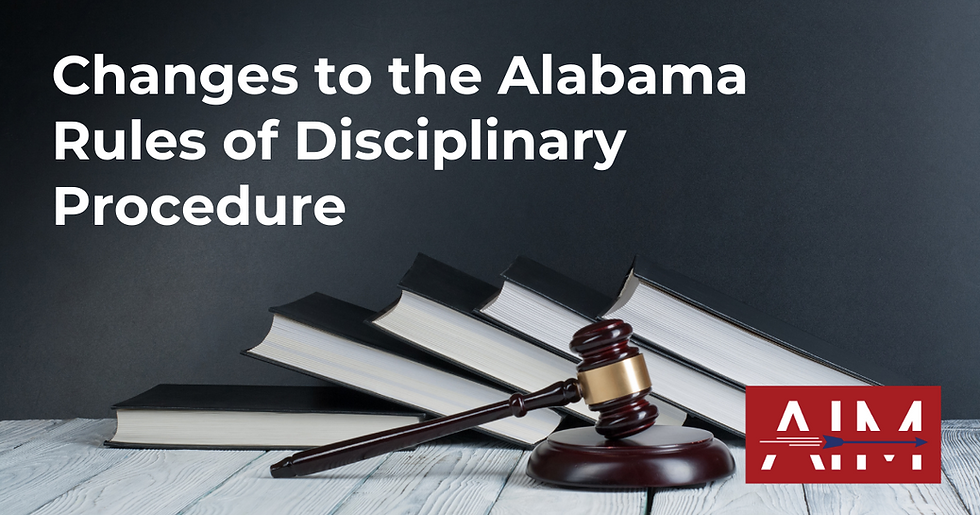Changes to the Alabama Rules of Disciplinary Procedure
- AIM
- Aug 18, 2021
- 3 min read

Many attorneys are not aware of the separate set of rules which govern attorney discipline in Alabama – the Alabama Rule of Disciplinary Procedure. The Rules are promulgated by the Alabama Supreme Court. The Court recently made amendments to the Rules which were adopted and effective July 23 of this year. Though the Supreme Court has always held the ultimate authority for attorney discipline, these changes create additional opportunities for the Supreme Court’s involvement.
Here are some highlights of the recent changes:
Rule 3(c)
Rule 3(c) was amended to allow the Supreme Court to initiate a disciplinary investigation or proceeding. Prior to the amendment, a disciplinary investigation or proceeding could be initiated by the General Counsel of the Alabama State Bar or a local grievance committee upon a complaint of another person or entity or upon the General Counsel’s or local grievance committee’s own motion in light of information received or acquired from any source.
Rule 6(c)
Rule 6(c) was added to require the approval of the Supreme Court for personnel decisions concerning the General Counsel of the Alabama State Bar, namely his or her appointment, compensation, and termination.
Rule 12
Rule 12 was amended to allow the Supreme Court to initiate and conduct investigations of alleged misconduct filed against a member of the Board of Bar Commissioners, the Executive Director, the General Counsel, a Disciplinary Hearing Officer, or a licensed attorney employed by the Alabama State Bar. The new subparagraph (c) sets forth the procedure for doing so.
Under the new procedure of 12(c), the Disciplinary Clerk of the Alabama State Bar shall immediately notify the Clerk of the Supreme Court whenever such an allegation or complaint is filed.
The Supreme Court may direct the General Counsel to conduct an investigation or may, at the expense of the Alabama State Bar, appoint an attorney of its choosing to conduct the investigation.
Once the investigation is completed, the Supreme Court will decide, by majority vote, whether the matter should be concluded by dismissal, by imposition of a private or public reprimand, or by the filing of formal charges before the Disciplinary Board.
If the Supreme Court finds that formal charges should be filed, it may appoint the General Counsel to prosecute the matter or may appoint an attorney of its own choosing.
The preexisting subparagraphs of Rule 12 were renumbered to allow for the addition of the new subparagraph (c). Other rules which referred to existing subparagraphs of Rule 12 were amended to refer to the newly renumbered subparagraphs (d), (e), (f), and (g). (Rules 9(c), 10(c), 11(c), 20(d), 27(d), and 28(j), and Rule 30(a)(1)).
Rule 12 was also amended to require the Disciplinary Clerk to send notice to the Clerk of the Supreme Court of a decision by the Disciplinary Commission to conclude a matter by dismissal. This is an amendment to the former subparagraph (c), new subparagraph (d).
Two new sub-subparagraphs were added to Rule 12, (g)(5) and (6) which require the Disciplinary Clerk to notify the Supreme Court of any suspension or disbarment for which no appeal is filed (and to forward the record which would have been forwarded if an appeal had been filed) and also gives the Supreme Court the power to hold the Bar’s Disciplinary Clerk in contempt for failing to comply with the Rules.
Rule 12 was also amended to allow the General Counsel to appeal a decision by the Disciplinary Commission to dismiss a complaint, with amendments to the former subparagraph (c)(1)(now (d)(1)) and an addition to the new subparagraph (g)(1).

Yorumlar